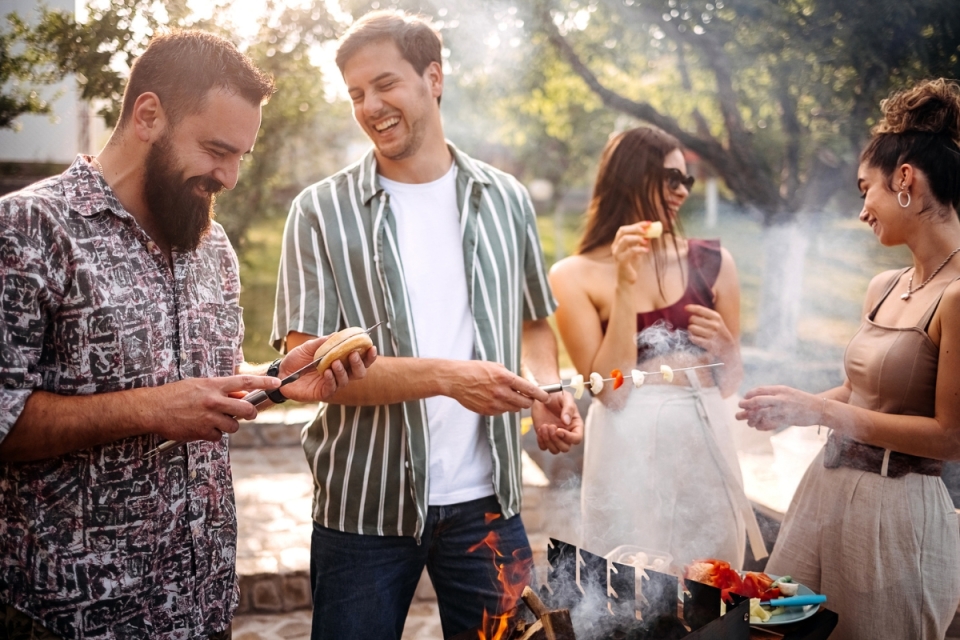There’s nothing like the smoky sizzle of a backyard barbecue — but if you’re not careful, even your best plans can go up in smoke. Robin Samaddar, MD, emergency medicine specialist and member of the HonorHealth Medical Staff, shares his top safety tips to keep your cookouts fun, flavorful and stress-free.
How to handle burns with a cool head
First, move away from the grill. “Run the wound under room temperature water and avoid ice water on the area,” Dr. Samaddar advises. “In addition, aloe or an antibacterial ointment such as bacitracin can be applied.”
For minor burns, head to one of our HonorHealth Urgent Care locations. If it blisters or covers a large area (especially the face and hands), visit an HonorHealth Emergency Department where our experts will work together to ease the pain and determine how severe the burn is.
Made in the shade: Heat hazards
Grilling in the intense Arizona sun is practically an extreme sport. These precautions can keep you safe, day and night.
- Fire it up at dusk. Not only will you see spectacular Arizona sunsets, you’ll also have more shade, reducing your risk of heat-related illnesses.
- Keep your cool. Use a misting fan and tuck a reflective sunshade behind the BBQ to reduce radiant heat on your back.
- Never spray sunscreen near an open flame. Swap highly flammable sprays for SPF lotion.
- Choose grilling tools with silicone handles rather than plastic-coated ones that melt like popsicles in a heatwave. Add oven mitts for extra protection.
The secret ingredient: Food safety
It’s easy to get distracted by a delicious dinner. Keep your guard up and the dangers down by paying attention to proper food prep.
- Store raw meat in a cooler of ice until you use it.
- Swap the wire cleaning brush for a mesh pad. If swallowed, wire bristles can get stuck in the throat, esophagus or intestines, causing small punctures that will send you to the ER faster than a burger flip.
- Marinade beef to prevent charring that can increase cancer-promoting carcinogens.
- Dip, dunk and chew thoroughly to avoid “steakhouse syndrome” where dry foods like well-done steak get stuck in your throat or esophagus.
- Use a meat thermometer to check for doneness: at least 165°F for poultry; 160°F for burgers, pork and eggs; and 145°F for steaks, roasts and fish.
If you experience nausea, vomiting or diarrhea within several hours of eating, that too-pink chicken wing could be the culprit.
To treat food poisoning symptoms, start by drinking water or juice. “If it gets to the point that you’re unable to keep anything down or you feel profoundly weak and cannot function, you should seek medical attention,” says Dr. Samaddar. Urgent care can help in mild cases, but he encourages patients with frequent stomach issues to discuss this with their general practitioner.
Grill smart, eat well
Grilling is a perfect way to enjoy the outdoors, especially in the Valley where it’s a year-round event. With a little extra awareness and the right precautions, you can keep your cookout cool and safe.
Related content
Feeling the heat?
Arizona heat isn’t just tough on your AC — it can stress your heart, too. Learn how to stay cool, hydrated and heart-healthy all summer long with these expert tips.
Your guide to healthy fats
Choosing healthy fats is essential for your overall health and well-being. Discover how to make smart food choices from our experts and empower yourself to lead a healthier life.
Summer feasts made guilt-free
Fire up the grill without guilt. Our expert shares tips to enjoy summer favorites like juicy burgers and buttery corn while keeping your meals delicious and nutritious.
